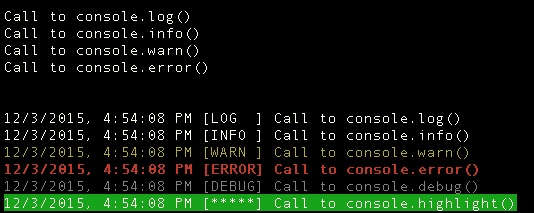OneLineLogger
Simple no-fuss colorised logging for NodeJS
Feature Overview
- Light-weight, quick to setup and easy to use.
- Multiple logger instances
- Customizable logger prefixes (to help distinguish logging from different modules)
- One line statement to optionally upgrade (colorize and timestamp) all existing uses of
console.log(),console.info(),console.warn()andconsole.error()throughout a code base. - Log to file.
- Configurable logging levels - DEBUG, INFO, WARN & ERROR.
Please note OneLineLogger is for NodeJS. It will not work in Web Browsers.
Installing
NPM
npm install onelineloggerGIT
Clone from GIT and install dependencies.
git clone https://github.com/garyns/OneLineLogger.git
cd OneLineLogger
npm installExamples
Basic Usage
// Variable logger is considered the 'default logger' instance. Custom loggers are discussed later.
var logger = require("onelinelogger");
logger.log("Call to logger.log()");
logger.info("Call to logger.info()");
logger.warn("Call to logger.warn()");
logger.error("Call to logger.error()");
logger.debug("Call to logger.debug()");
logger.highlight("Call to logger.highlight()");Here is the output:
For onelinelogger 1.1.2+ logger.boo() is an alias for logger.highlight()
Overloading console.log() and related functions
var logger = require("onelinelogger");
// Before Overloading
console.log("Call to console.log()");
console.info("Call to console.info()");
console.warn("Call to console.warn()");
console.error("Call to console.error()");
// Overload with default logger
logger.replaceConsole();
console.log("Call to console.log()");
console.info("Call to console.info()");
console.warn("Call to console.warn()");
console.error("Call to console.error()");
console.debug("Call to console.debug()");
console.highlight("Call to console.highlight()");Here is the output (spacing added):
Custom Logger Instance
Create custom loggers to help associate log entries with different parts of your code.
// Default Logger instance
var logger = require("onelinelogger");
// Custom Logger instance
// [MY_LOGGER] is now added to every line
var myLogger = logger.create("MY_LOGGER");
myLogger.log("Call to myLogger.log()");
myLogger.info("Call to myLogger.info()");
myLogger.warn("Call to myLogger.warn()");
myLogger.error("Call to myLogger.error()");
myLogger.debug("Call to myLogger.debug()");
myLogger.highlight("Call to myLogger.highlight()");
// Alternatively, you could...
var myLogger2 = require("onelinelogger").create("MY_LOGGER2");Here is the output:
You can change the 'prefix' of a logger by calling setPrefix().
var logger = require("onelinelogger");
// Output of default logger now prefixed with [MAIN]
logger.setPrefix("MAIN");
// Customer Logger - [MY_LOGGER] is added to every line...
var myLogger = logger.create("MY_LOGGER");
// ... And now it's [THEIR_LOGGER]
myLogger.setPrefix("THEIR_LOGGER");Global Settings
These settings affect ALL logger instances - that is the default logger and any custom loggers you create.
var logger = require("onelinelogger");
// Append all output to a file
logger.setGlobalFile("log.txt");
// Stop logging to a file
logger.setGlobalFile(null);
// Set the length of the prefix text
// Tweaking this property helps you keep your text lining up
// Eg 0 -> [MAIN], where 10 -> [MAIN ]
logger.setGlobalPrefixLength(10);
// Set Logging Level to one of constants logger.DEBUG logger.INFO (default), logger.NOTICE, logger.WARN or logger.ERROR, or alternatively the strings DEBUG, INFO, NOTICE, WARN or ERROR
logger.setLevel(logger.INFO)
logger.setLevel("WARN")
// Get Logging Level (as Number 0 - 4).
const currentLogLevel = logger.getLevel()
// Get Logging Level Name (DEBUG, INFO, NOTICE, WARN or ERROR)
const currentLogLevelName = logger.getLevelName()
// Suppress (false) or show (true) calls to .debug()
// NOTE deprecated in v1.1.2. Use setLevel(logger.DEBUG) instead.
logger.setGlobalDebugging(true);
// Check if log level is logger.DEBUG
const debugging = logger.isDebug();
// The previous isDebug() example is equivalent to
const debugging = logger.getLevel() === logger.DEBUG

